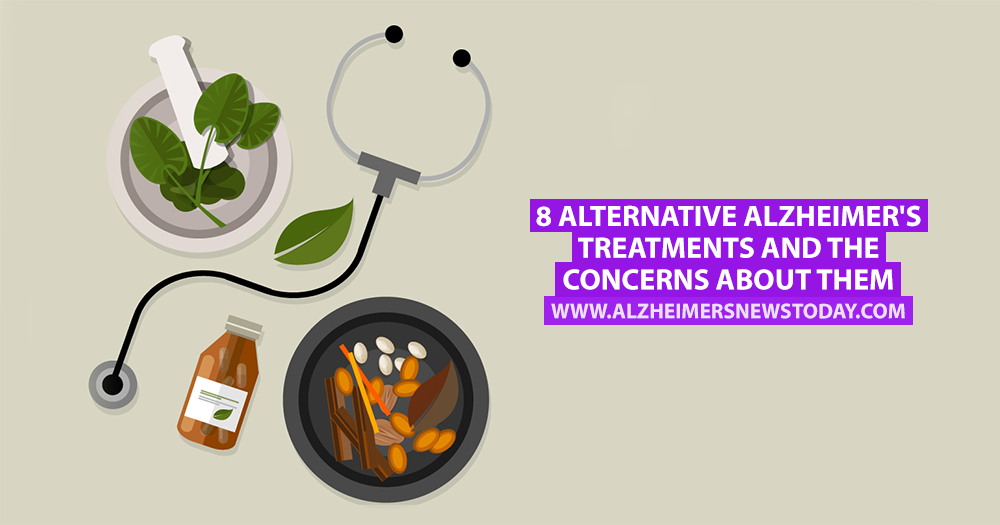8 Alternative Alzheimer’s Treatments and the Concerns About Them

Though there are many different alternative treatments and therapies touted for helping those who live with Alzheimer’s disease, they’re often unproven. While taking some supplements is unlikely to cause any adverse health issues, there are some that may cause problems, particularly where purity cannot be assured, a safe dosage hasn’t been established or if the supplements interfere with prescribed medications.
The Alzheimer’s Association has listed eight alternative therapies that may help people living with the condition and the concerns surrounding each one.
MORE: Could it be Alzheimer’s disease, depression, or both?
Caprylic Acid and Coconut Oil
Caprylic acid is a medium-chain triglyceride which is derived from either palm kernel oil or coconut oil. The fat is broken down by the body into ketone bodies which provide the brain with an alternative energy source for brain cells that are no longer able to use sugar (glucose) as an energy form. It was marketed as a medical food under the brand name Axona.
In a phase II clinical trial of 152 Alzheimer’s patients, those who took Axona alongside their usual medication reported better results on memory and cognitive function tests. However, according to the Mayo Clinic, the company was ordered by the FDA to stop marketing the product as a medical food and a phase III clinical trial of Axona as a drug showed no benefits.
Some patients and caregivers use coconut oil as a cheap and easily available alternative to Axona and while many have reported positive effects, there has been no official clinical testing of the impact of coconut oil on Alzheimer’s disease.
Phosphatidylserine
Phosphatidylserine is a type of lipid (fat), which is an important element of the membrane that surrounds nerve cells. It’s thought that taking phosphatidylserine supplements can help strengthen the nerve cells leading to less erosion.
However, clinical trials of the compound used phosphatidylserine derived from cow’s brains which led to concerns about the human form of mad cow disease Variant Creutzfeldt–Jakob disease (vCJD). Later products were derived from soy to eliminate the risk, but the FDA feels that there hasn’t yet been enough scientific evidence to suggest that the lipid is of benefit to Alzheimer’s patients so it is not currently recommended, although more research is being conducted.
MORE: Preventing immune response shows promise for Alzheimer’s and other disorders
Coenzyme Q10
Coenzyme Q10 (also known as ubiquinone) is a naturally occurring antioxidant which helps with healthy cell reactions. A synthetic alternative called idebenone was clinically tested on Alzheimer’s patients but no benefit was found. However, there has been no testing of Coenzyme Q10 for Alzheimer’s so safe dosage is unknown and the side effects of the compound are also unclear.
Coral Calcium
Coral calcium is a compound derived from the shells from coral reefs. The difference to normal calcium supplements is the addition of minerals from the shells. However, no additional benefit has been found in coral calcium for bone health or for Alzheimer’s patients compared to normal calcium supplements and the FDA has filed complaints against manufacturers and promoters of coral calcium for stating exaggerated health benefits.
Omega-3 Fatty Acids
Two specific omega-3 fatty acids — eicosapentaenoic acid (EPA) and docosahexaenoic acid (DHA) — have been linked to a reduced risk of stroke or heart disease. In addition, research has found that the fatty acids may also help to prevent cognitive decline and dementia.
However, there has been mixed results and some studies have found omega-3 fatty acids had little effect on cognitive improvement in Alzheimer’s disease whereas others have shown patients taking the substances faired slightly better on memory tests.
MORE: Abnormal amounts of unsaturated fatty acids might be Alzheimer’s tipping point
Ginkgo Biloba
The ancient Chinese medicine ginkgo biloba is an antioxidant and anti-inflammatory plant extract that’s believed to have positive effects on brain cells and may help to regulate neurotransmitter function.
A phase III clinical trial on the effect of the extract on Alzheimer’s patients found ginkgo biloba was no more effective in delaying or preventing Alzheimer’s disease than the placebo.
Huperzine A
Huperzine A is another ancient Chinese medicine which comes from moss. It’s often recommended to Alzheimer’s patients because it has similar properties to cholinesterase inhibitors which are commonly prescribed to help block the production of enzymes which slow down neurotransmitters.
Again a phase III clinical trial showed no difference in Alzheimer’s patients who took huperzine A compared to those who took a placebo. Because the supplement is unlicensed, there are concerns about dosage and the compound’s ability to interfere with other Alzheimer’s medications.
Tramiprosate
Tramiprosate is an amino acid found in seaweed and is a modified form of taurine. A phase III clinical trial of the substance was inconclusive so instead of further testing to market the product as a prescription drug, the company made the decision to market it as a medical food instead, which means it’s not regulated by the FDA as a drug. To date, there has been no proven evidence that tramiprosate benefits Alzheimer’s patients although more research is being conducted.
MORE: Alzheon moves forward with tramiprosate development in select Alzheimer’s patients
Alzheimer’s News Today is strictly a news and information website about the disease. It does not provide medical advice, diagnosis or treatment. This content is not intended to be a substitute for professional medical advice, diagnosis, or treatment. Always seek the advice of your physician or another qualified health provider with any questions you may have regarding a medical condition. Never disregard professional medical advice or delay in seeking it because of something you have read on this website.



